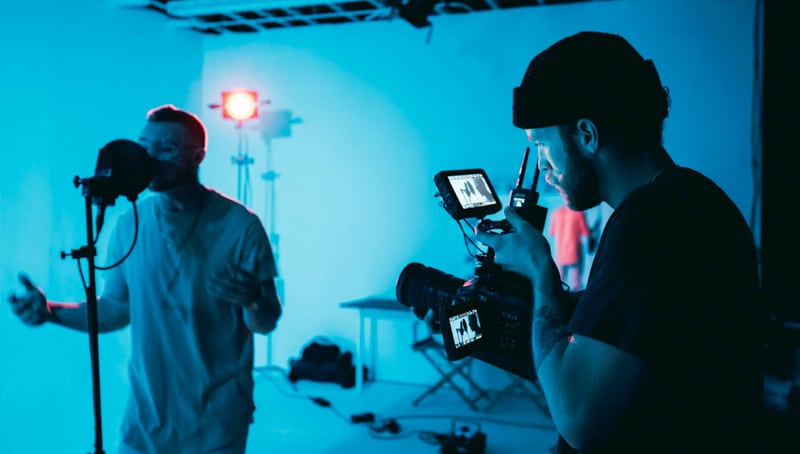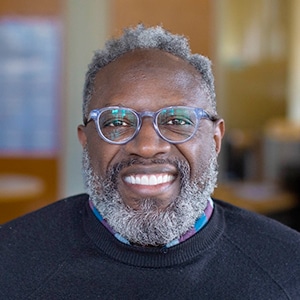FLM 204: Final Project
From Rough Cut to Final Cut
In this course, you'll produce a complete short narrative or documentary film from concept to screening. Guided by your instructor, students will script, shoot, and edit a short narrative or documentary film. In the first half of the course, students will complete all aspects of pre-production: scripting, planning, recruiting, and more. In the second half, students will shoot and edit their film, refining their project into a polished production, having gained insights from multiples rounds of feedback, informed by course content, inspiration, and your lived experience.

About This Course
Project-Based Learning
Demonstrate your ability to employ a wide range of filmmaking techniques while leveraging your creative vision. You will conceptualize, write, plan, cast, direct, light, shoot, edit and produce both a rough and final cut of a short film ready for screening.
What Skills Will I Develop?
Students in this course can expect to learn to:
- Produce a complete short narrative or documentary film from concept to screening.
- Draft and finalize a script to direct, shoot, and edit to assess your current portfolio, identify enhancements, and improve your work based on your portfolio goals.
- Employ and advance skills during multiple aspects of pre-production including scripting, planning, casting, and more.
- Analyze and enhance creative work in response to constructive feedback.
- Gather, organize, and finalize creative work and projects in preparation for seeking enrollment opportunities within your industry.
- Demonstrate the ability to effectively communicate your ideas visually, in written form, and through a presentation.
What Software and Supplies Do I Need?
- Computer with a minimum internet connection speed of 512 kbps. Broadband is strongly recommended.
- Adobe Premiere Pro software (course instruction is tailored to this platform).
Students using other non-linear editing programs (e.g., Final Cut Pro, DaVinci Resolve) are welcome to join the class, but should be prepared to adapt to differences in interface and features. - Access to a digital video camera or a smartphone capable of capturing high-quality video.
- Ability to transfer video from camera/smartphone to computer.
Are There Course Prerequisites?
FLM 101 Cinematography, FLM 102 Editing, FLM 103 Screenwriting I, and FLM 104 Directing are prerequisites for this course or courses can be taken concurrently.
If you have any questions about this course, please contact Admissions@sessions.edu.
Course Instructor(s)
The course is taught by the following instructor(s):

André Robert Lee is a filmmaker, keynote speaker, consultant, writer, and educator. His process includes Many Things; New York City Public Schools, The Ford Foundation, Miramax Films, Urbanworld, Film Movement, Diana Ross, BET, Paramount TV, and more.
View all Faculty
Course Outline
Project Ideation
This course is where you apply everything you've learned in this program. You'll begin by identifying and developing a concept for a short movie. Whether you choose a fictional narrative or documentary (or a comparable personal project) this is your chance to stretch your digital storytelling skills.
Scripting and Storyboarding
It's time to flesh out the stories that will appear on screen, and think about what sets, equipment, locations, actors, and what creative colleagues you may need to enlist to carry out your project. Developing scripts and rough storyboards can help you visualize your concepts.
Production Planning
Your ideas have had plenty of time to marinate, it's time to put commit to your production plans, finalizing the important dates and details for your live shooting. Check the weather and double-check your actors, equipment, transport, and more, as you refine the blueprint for your vision.
Shooting
It's time to flex your directorial skills. Whether you are in a studio or in a series of locations, you need to keep your project and crew focused on capturing the best takes or footage to fulfill the goals of your project. Expect the unexpected and power through inevitable surprises that occur as you gather the material for your project.
Rough Cut
Back in the studio, you are creating a rough cut is a full-length cut of your video—not a finely-tuned, meticulous edit of the first half of your video. A viewer should be able to follow your plot even though the video lacks polish. For a rough cut, you might use placeholder text, temporary music, or rough transitions that you'll need to go back and spend more time on later.
Final Cut
After some feedback, you are finally ready to edit your Final Cut. The final cut is your finished film, ready to present to an audience. Everything is polished. The pacing is smooth, transitions are seamless, and the audio is tuned and tweaked appropriately. We can't wait to see it!
Frequently Asked Questions (FAQ)
How Do The Courses Work?
Our courses are project-based and instructor-led. In each course you’ll complete a series of lectures, projects, discussions, and critiques designed to stretch your creative skills. Weekly assignment deadlines keep you on track, and with no set-logins or Zoom meetings, you can build your studies around your schedule.
Who Are The Instructors?
Our courses are developed and taught by our industry-leading faculty of creative professionals. This means that you’ll learn in-demand skills, get feedback on your work, and build a portfolio of creative work. View our Student Gallery for featured student projects.
When Can I Start?
Classes start January, April, and August, and this course is completed in a 15-week term. This course is not available for individual enrollment; it can only be taken as part of a program.
Explore our Programs: Bachelor's Degree | Associate Degree | Undergraduate Certificate
How Do I Register?
This course is not available for individual enrollment; it can only be taken as part of a program. To register for a program, complete our program application.
Is Sessions College Accredited?
Yes. Since 2001, Sessions College has been accredited by the Distance Education Accrediting Commission (DEAC). The Distance Education Accrediting Commission is listed by the U.S. Department of Education as a recognized accrediting agency and is recognized by the Council for Higher Education Accreditation (CHEA).
RELATED PROGRAMS AT SESSIONS COLLEGE:

